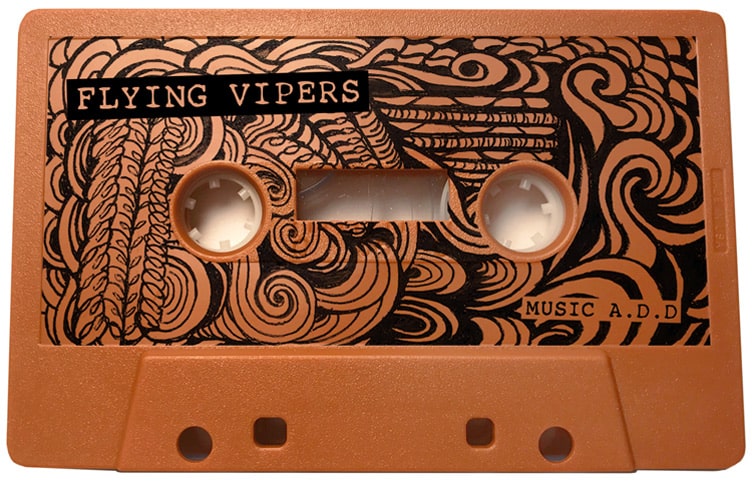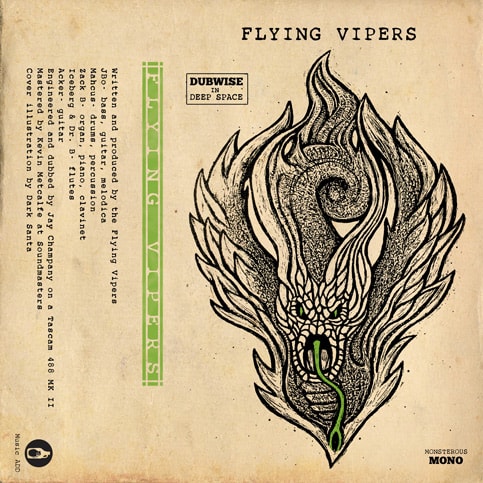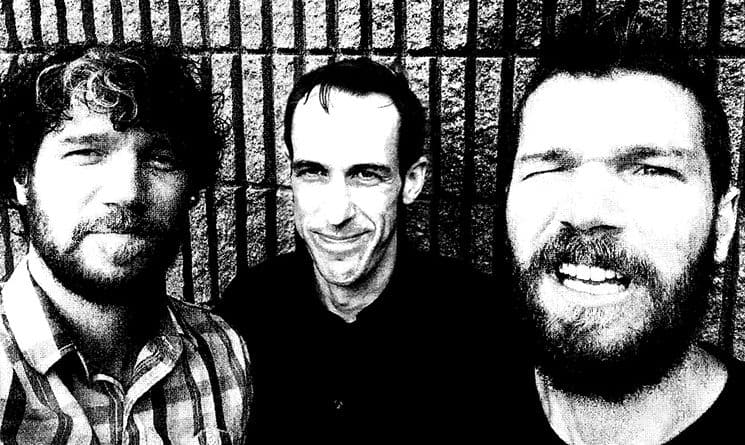According to their most literal definitions, “lo-fi and “dub” seem completely antithetical. The first evokes the sense of a no-name singer-songwriter recording demos in his basement, a la Elliott Smith, waiting for that special person to hear the genius buried beneath the hiss of the rolling tape. The other elicits a genre of music created solely on sound effects generated by foot pedals.
What’s incredible about the Flying Vipers is that the band seeks to completely destroy those stereotypes, to deconstruct the inner workings of lo-fi and dub and build them together into music that is as simple as it is intricate.
The band’s latest release, “The Copper Tape, is the second volume of this unique project. The trio is comprised of twin brothers John and Marc Beaudette, of Boston-based projects Destroy Babylon and The Macrotones (among others), and Zack Brines of Pressure Cooker and The Kings of Nuthin’. In addition to the core guitar-bass-drums lineup, the boys pepper in other instruments such as melodica, organ, and clavinet.
The Flying Vipers’ not-so-secret weapon is the live mixing run by Jay Champany. Using an eight-track recorder, Champany manually mixes the songs as the band records them on a Tascam 488 MK II. The band records and mixes the songs direct to cassette, creating a completely clean, coherent sound with the authenticity of a true-to-life throwback item. Ironically enough, amidst a renewed interest in cassette tapes, the sound quality of “The Copper Tape surpasses most others, despite recording the album in the most lo-fi way possible.
The Vipers’ music harkens back to the kings of 1970s dub, such as King Tubby and Lee “Scratch Perry. Deep grooves carry the songs, fused with pulsing bass lines and, of course, the best psychedelia in town. Songs like “Mighty Mezz and “Return of the Living Zero feature bubbling guitar riffs and organ chords that appear out of nowhere, shimmer beautifully in the lingering air, and then disappear as the bass and drums keep walking along the tape reel. The tape even features a dubbed-out version of the D&D classic “Warriors of the Eternal Sun for all of us gaming nerds out there.
Whether you need a bit of summery music to escape your winter blues, or you’ve got some “strong coffee and even stronger herb” waiting for you this weekend, “The Copper Tape” showcases badass reggae tunes in the coolest vehicle available.
In advance of their show at Boston’s Paradise Rock Club on Friday, The Sound caught up with the brothers Beaudette, New Hampshire natives who can often be found in Rye. They talked about their new tape, their psychedelic approach to songwriting, and what 2017 has in store for the Flying Vipers.

Tell me a little bit about how “The Copper Tape” came to be. Last time we spoke, Flying Vipers seemed like more of a conceptual side project, but now you guys are opening for Big D & The Kids Table.
John Beaudette: The Vipers are still a side thing, but we’re trying to make the live version happen. The biggest hurdle is always finding the time.
Marc Beaudette: Destroy Babylon has always been about pushing ourselves musically, and we tend to relish in the early experimental stage of writing. It’s been nice to balance that with a project that focuses strictly on one sound. We can start and finish songs in a night. The live aspect is a new goal, now that we’ve got the material.
Describe the writing process for this album. How do you guys write for the Flying Vipers differently than for Destroy Babylon or your other projects?
JB: (Destroy Babylon) is a larger group effort where all members contribute song ideas and lyrics, and there are few boundaries, style-wise. While we all love Jamaican music, that is only one piece of the puzzle. I’d say that band is more post-punk-influenced than anything.
MB: We’re restless, musically. We called our label Music ADD knowing we’d probably end up in a few different genre bins. Vipers has been a welcome exercise in restraint.
JB: (Flying Vipers) is a trio, so working out material is much quicker. It’s all about writing a rhythm for bass and drums. Everything starts there, then we build the chord changes — all two of them — and melodies off of that. Jay adds valuable input and guidance while engineering, as well.
How much did the songwriting process change between “The Green Tape” and “The Copper Tape”?
JB: Both sessions were similar in how we approached the writing and recording, but we wanted this one a little more stripped down and dubbed out.
MB: I think we locked in on grooves a bit more this time around, knowing we’d have more fun with post-production effects.
How long had you guys been working on these songs before you started tracking them?
JB: Not long at all. We had maybe two brief rehearsals before tracking everything.
MB: Yeah, we did two this time. One more than the first tape.

Recording direct to cassette must make you a little nervous. Because you’re recording all your tracks on one master tape, does that limit the amount of takes you can do?
JB: The amount of takes are only limited by the amount of blank tapes we have. We don’t get nervous, but it does help keep us focused more since we don’t want to waste tape.
MB: We typically don’t go more than a couple takes. Our limits are in the tracks. There are only so many inputs to work with since all the mixing is also done on the tape machine.
The songs on “The Copper Tape” come across as a little more atmospheric and psychedelic than the straight-forward, lo-fi sound of “The Green Tape.” Did you feel Jay was experimenting more this time and taking bigger risks when mixing the album live?
JB: In addition to the RE-201 and Tapco reverb, Jay used a Mu-tron Phasor II on a handful of tracks and, in general, made everything a bit more spaced out. “The Green Tape” was done on a Tascam 488, but “The Copper Tape” was actually done on the mark 2 version, which adds some more EQ options, so Jay was able to add in some high- and low-pass filter effects. Far from sounding like King Tubby’s desk, but definitely more out there than the last one.
You guys sent the tape to Kevin Metcalfe in London to be mastered. Why did you choose to have Kevin master the tape, considering the distance between you guys?

